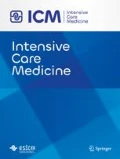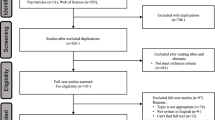Abstract
Purpose
Intensive care unit (ICU) nurses are at increased risk of developing psychological problems including posttraumatic stress disorder (PTSD). However, there are resilient individuals who thrive and remain employed as ICU nurses for many years. The purpose of this study was to identify mechanisms employed by highly resilient ICU nurses to develop preventative therapies to obviate the development of PTSD in ICU nurses.
Methods
Qualitative study using semi-structured telephone interviews with randomly selected ICU nurses in the USA. Purposive sampling was used to identify ICU nurses who were highly resilient, based on the Connor–Davidson Resilience Scale and those with a diagnosis of PTSD, based on the posttraumatic diagnostic scale. New interviews were conducted until we reached thematic saturation.
Results
Thirteen highly resilient nurses and fourteen nurses with PTSD were interviewed (n = 27). A constructivist epistemological framework was used for data analysis. Differences were identified in four major domains: worldview, social network, cognitive flexibility, and self-care/balance. Highly resilient nurses identified spirituality, a supportive social network, optimism, and having a resilient role model as characteristics used to cope with stress in their work environment. ICU nurses with a diagnosis of PTSD possessed several unhealthy characteristics including a poor social network, lack of identification with a role model, disruptive thoughts, regret, and lost optimism.
Conclusion
Highly resilient ICU nurses utilize positive coping skills and psychological characteristics that allow them to continue working in the stressful ICU environment. These characteristics and skills may be used to develop target therapies to prevent PTSD in ICU nurses.
Similar content being viewed by others
References
Buerhaus PI, Auerbach DI, Staiger DO (2009) The recent surge in nurse employment: causes and implications. Health Aff (Millwood) 28:w657–w668
Aiken LH, Clarke SP, Sloane DM, Sochalski JA, Busse R, Clarke H, Giovannetti P, Hunt J, Rafferty AM, Shamian J (2001) Nurses’ reports on hospital care in five countries. Health Aff (Millwood) 20:43–53
Mealer M, Burnham EL, Goode CJ, Rothbaum B, Moss M (2009) The prevalence and impact of post traumatic stress disorder and burnout syndrome in nurses. Depress Anxiety 26:1118–1126
Mealer ML, Shelton A, Berg B, Rothbaum B, Moss M (2007) Increased prevalence of post-traumatic stress disorder symptoms in critical care nurses. Am J Respir Crit Care Med 175:693–697
Charney DS (2004) Psychobiological mechanisms of resilience and vulnerability: implications for successful adaptation to extreme stress. Am J Psychiatry 161:195–216
Connor KM, Davidson JR (2003) Development of a new resilience scale: the Connor-Davidson Resilience Scale (CD-RISC). Depress Anxiety 18:76–82
Milne D (2007) People can learn markers on road to resilience. Psychiatric News 42:5–10
Mealer M, Jones J, Newman J, McFann K, Rothbaum B, Moss M (2012) The presence of resilience is associated with a healthier psychological profile in intensive care unit (ICU) nurses: results of a national survey. Int J Nurs Stud 49:292–299
Checker S (2009) Cognitive behavioral therapy. The Mayo Foundation. http://www.mayoclinic.com/health/c-b-t/MY00194. Accessed 3 May 2012
Mueser KT, Salyers MP, Rosenberg SD, Ford JD, Fox L, Carty P (2001) Psychometric evaluation of trauma and posttraumatic stress disorder assessments in persons with severe mental illness. Psychol Assess 13:110–117
Sheeran T, Zimmerman M (2002) Screening for posttraumatic stress disorder in a general psychiatric outpatient setting. J Consult Clin Psychol 70:961–966
Foa E, Cashman L, Jaycox L, Perry K (1997) The validation of a self-report measure of posttraumatic stress disorder: the posttraumatic diagnostic scale. Psychol Assess 9:445–451
Campbell-Sills L, Forde DR, Stein MB (2009) Demographic and childhood environmental predictors of resilience in a community sample. J Psychiatr Res 43:1007–1012
Mealer M, Jones J, Moss M (2011) Psychological characteristics of highly resilient ICU nurses: results of a qualitative study. Am J Respir Crit Care Med 183:A4114
Thorne S, Reimer Kirkham S, O’Flynn-Magee K (2004) The analytic challenge in interpretive description. Int J Qual Methods 3:1–11
Thorne S (2008) Interpretive description. Left Coast, California
Thomas DR (2006) A general inductive approach for analyzing qualitative evaluation data. Am J Eval 27:237–246
Hanna DR, Romana M (2007) Debriefing after a crisis. Nurs Manage 38:38–47
Quenot JP, Rigaud JP, Prin S, Barbar S, Pavon A, Hamet M, Jacquiot N, Blettery B, Hervé C, Charles PE, Moutel G (2012) Suffering among carers working in critical care can be reduced by an intensive communication strategy on end-of-life practices. Intensive Care Med 38:55–61
Ozbay F, Johnson DC, Dimoulas E, Morgan CA, Charney D, Southwick S (2007) Social support and resilience to stress: from neurobiology to clinical practice. Psychiatry (Edgmont) 4:35–40
Ozbay F, Fitterling H, Charney D, Southwick S (2008) Social support and resilience to stress across the life span: a neurobiologic framework. Curr Psychiatry Rep 10:304–310
Jensen HI, Ammentorp J, Erlandsen M, Ording H (2011) Withholding or withdrawing therapy in intensive care units: an analysis of collaboration among healthcare professionals. Intensive Care Med 37:1696–1705
Sharkansky EJ, King DW, King LA, Wolfe J, Erickson DJ, Stokes LR (2000) Coping with Gulf War combat stress: mediating and moderating effects. J Abnorm Psychol 109:188–197
Haden S, Scarpa A, Jones R, Ollendick T (2007) Posttraumatic stress disorder symptoms and injury: the moderating role of perceived social support and coping for young adults. Personality Individ Differ 42:1187–1198
Aldwin CM, Levenson MR, Spiro A III (1994) Vulnerability and resilience to combat exposure: can stress have lifelong effects? Psychol Aging 9:34–44
Davis M (1998) Are different parts of the extended amygdala involved in fear versus anxiety? Biol Psychiatry 44:1239–1247
Yehuda R, Flory JD, Southwick S, Charney DS (2006) Developing an agenda for translational studies of resilience and vulnerability following trauma exposure. Ann N Y Acad Sci 1071:379–396
Dollinger SJ (1986) The measurement of children’s sleep disturbances and somatic complaints following a disaster. Child Psychiatry Hum Dev 16:148–153
Brissette I, Scheier MF, Carver CS (2002) The role of optimism in social network development, coping, and psychological adjustment during a life transition. J Pers Soc Psychol 82:102–111
Rasmussen HN, Wrosch C, Scheier MF, Carver CS (2006) Self-regulation processes and health: the importance of optimism and goal adjustment. J Pers 74:1721–1747
Carver CS, Pozo-Kaderman C, Harris SD, Noriega V, Scheier MF, Robinson DS, Ketcham AS, Moffat FL Jr, Clark KC (1994) Optimism versus pessimism predicts the quality of women’s adjustment to early stage breast cancer. Cancer 73:1213–1220
Scheier MF, Matthews KA, Owens JF, Schulz R, Bridges MW, Magovern GJ, Carver CS (1999) Optimism and rehospitalization after coronary artery bypass graft surgery. Arch Intern Med 159:829–835
Waite PJ, Richardson GE (2003) Determining the efficacy of resiliency training in the work site. J Allied Health 33:178–183
Burton N, Pakenham K, Brown W (2010) Feasibility and effectiveness of psychosocial resilience training: a pilot study of the READY program. Psychol Health Med 15:266–277
Acknowledgments
This study was sponsored by the National Institutes of Health and grant number K24 HL-089223.
Author information
Authors and Affiliations
Corresponding author
Electronic supplementary material
Below is the link to the electronic supplementary material.
Rights and permissions
About this article
Cite this article
Mealer, M., Jones, J. & Moss, M. A qualitative study of resilience and posttraumatic stress disorder in United States ICU nurses. Intensive Care Med 38, 1445–1451 (2012). https://doi.org/10.1007/s00134-012-2600-6
Received:
Accepted:
Published:
Issue Date:
DOI: https://doi.org/10.1007/s00134-012-2600-6




